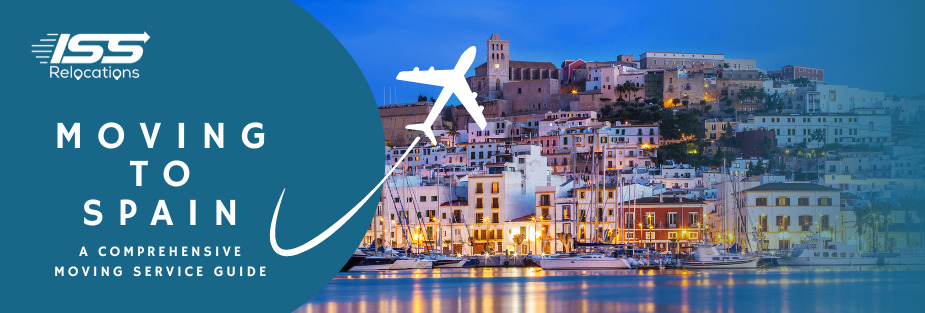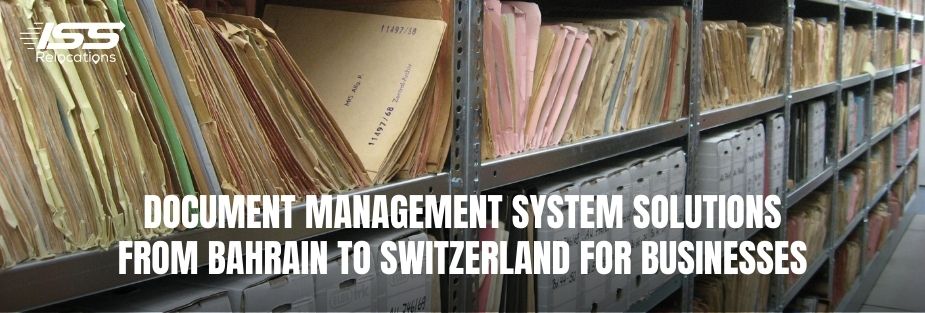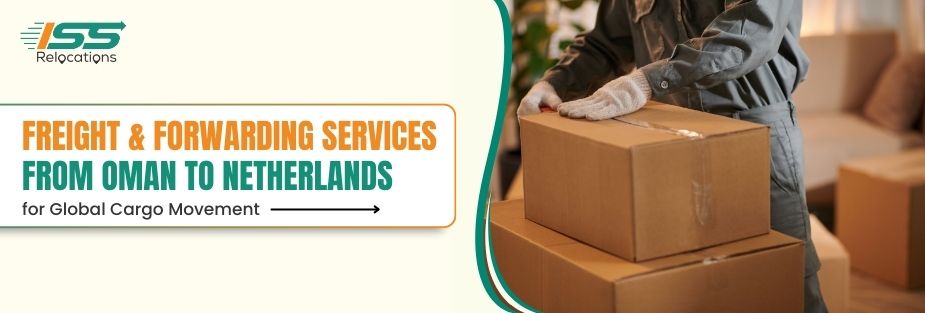
Moving to Spain – A Comprehensive Moving Service Guide
Spain, a country renowned for its vibrant culture, stunning landscapes, and rich history, has become a top destination for those looking to relocate abroad. Whether it’s the allure of the Mediterranean coastline, the bustling urban life of Madrid and Barcelona, or the tranquil countryside, moving to Spain offers a diverse range of living environments to suit various lifestyles.
This comprehensive guide aims to provide international relocation detailed information on everything you need to know about your move to Spain, from preparation and costs to freight methods and settling in. With ISS Relocations, your move to Spain can be seamless and stress-free.
Moving Services to Spain?
Revolutionize the Way You Move – Try a Better Method Today
Why Move to Spain?
Moving to Spain A Comprehensive Moving Service Guide
Spain is celebrated for its high quality of life, which makes it an attractive destination for expats worldwide. Here are some compelling reasons why moving to Spain could be a great decision:
Lifestyle and Culture
Moving to Spain offers a unique blend of modernity and tradition. The country is famous for its relaxed lifestyle, characterized by leisurely siestas and vibrant fiestas. Spanish culture is rich and diverse, with each region boasting its own distinct traditions, cuisine, and festivals. From the flamenco rhythms of Andalusia to the pintxos bars of the Basque Country, there’s always something new to explore.
Climate
Spain’s climate is another major draw. With more than 300 sunny days a year in many regions, the country is perfect for those who love outdoor activities. The Mediterranean coast enjoys mild winters and hot summers, making it an ideal spot for beach lovers. Inland cities like Madrid have a continental climate, offering a different yet equally appealing experience.
Quality of Life
Spain ranks high in global quality of life indices, thanks to its excellent healthcare system, affordable cost of living, and strong sense of community. The country offers free public healthcare to residents, and private healthcare is also affordable and of high quality. Education in Spain is well-regarded, with a variety of international schools catering to expat families.
Cost of Living
Compared to many Western European countries, Spain is relatively affordable. The cost of living varies by region, with cities like Madrid and Barcelona being more expensive than smaller towns and rural areas. Housing, groceries, and dining out are generally cheaper than in many other European countries. This affordability makes it easier to enjoy a high standard of living without breaking the bank.
Work-Life Balance
Spaniards are known for their emphasis on work-life balance. The typical Spanish workday often includes a long lunch break and ends later in the evening, allowing for a more relaxed pace of life. Many businesses close in the afternoon for siesta, reopening in the evening. This cultural emphasis on leisure and family time can be a refreshing change for those moving from more work-centric environments.
Community and Social Life
Spain is renowned for its strong sense of community and vibrant social life. Whether you are in a big city or a small village, you will find that locals are welcoming and friendly. The numerous festivals and local events provide ample opportunities to integrate and make new friends.
Preparing for the Move
Moving to Spain involves several steps that require careful planning and organization. Early preparation is crucial to ensure a smooth transition. Here’s a guide to help you get started:
Research and Planning
Start by researching the different regions in Spain to determine where you’d like to live. Consider factors such as climate, job opportunities, cost of living, and lifestyle. Create a detailed moving plan that outlines all the tasks you need to complete before your move.
Documentation
Ensure you have all the necessary documentation in order. This includes your passport, visa, and any permits required for your stay in moving to Spain. If you’re moving with family, make sure everyone’s documents are up to date. Gather important personal records such as medical, dental, and school records.
Financial Preparation
Open a Spanish bank account to manage your finances more easily once you arrive. Notify your current bank of your move and consider transferring funds to your new account. Plan your budget to cover initial expenses such as housing, transportation, and daily living costs.
Housing
Research housing options and consider renting a temporary place first. This allows you to explore the area and decide where you want to settle long-term. Websites and local real estate agents can help you find rental properties.
Health and Insurance
Arrange for health insurance coverage in Spain. Although Spain offers free public healthcare, having private insurance can provide additional benefits and peace of mind. If you take any prescription medications, ensure you have enough supply until you can see a doctor in Spain.
Language Preparation
While many Spaniards speak English, learning basic Spanish phrases can help you navigate daily life and integrate into the community more easily. Consider taking a language course or using language learning apps to get started.
Moving Logistics
Hire a reputable moving company like ISS Relocations to handle the logistics of your move. ISS Relocations can assist with packing, shipping, and delivering your belongings to your new home in Spain. Their expertise in international moves ensures that your items will arrive safely and on time.
Understanding the Costs
Relocating to Spain involves various costs that can vary significantly based on several factors. Here’s a detailed breakdown to help you understand what to expect:
Factors Affecting Moving Costs
- Distance and Destination: The further your current location is from Spain, the higher the transportation costs.
- Volume of Goods: The more items you move, the higher the cost. It’s advisable to declutter and take only what you need.
- Mode of Transport: Air freight is faster but more expensive, while sea freight is more economical but takes longer.
- Insurance: Protecting your belongings with insurance adds to the cost but provides peace of mind.
- Customs Fees and Taxes: Be prepared for potential customs duties on certain items.
Cost Breakdown
- Packing and Moving Supplies: Costs for boxes, tape, and packing materials.
- Transportation: Charges for shipping your belongings via air, sea, or land.
- Insurance: Fees for insuring your items during transit.
- Customs and Duties: Costs associated with importing goods into Spain.
- Temporary Accommodation: Expenses for temporary housing while you search for a permanent home.
Get Quick Support
Freight Methods for Moving to Spain
Understanding the different freight methods can help you choose the best option for your needs:
Air Freight
Fast delivery (usually within a week), ideal for urgent shipments or valuable items.
Expensive, limited capacity for large items.
Small, valuable, or urgent shipments.
Sea Freight
Economical, can handle large volumes and bulky items.
Slow (can take several weeks), potential for delays.
Large household moves, non-urgent items.
Land Transport
Cost-effective for moves within Europe, flexible.
Not an option for overseas moves, limited by road infrastructure.
Moves within the European continent.
How Much Does It Cost to Relocate to Spain?
The total cost of relocating to Spain can range from a few thousand to several thousand euros, depending on the factors mentioned above. For instance, a small air freight shipment might cost around €2,000-€5,000, while a full container via sea freight could range from €6,000-€10,000.
Choosing the Right Freight Method
When deciding on the best freight method, consider your budget, the urgency of your move, and the volume of your belongings. ISS Relocations offers a variety of freight options to suit different needs and budgets, ensuring that your items arrive safely and on time.
Settling in Spain
Once you’ve arrived in Spain, there are several important steps to take to ensure a smooth transition and successful integration into your new home. Here’s what you need to know about settling in:
Registering with Local Authorities
One of the first things you’ll need to do is register with the local authorities. This process includes obtaining a NIE (Número de Identificación de Extranjero), which is an identification number for foreigners. The NIE is essential for various activities such as opening a bank account, signing a lease, and setting up utilities.
Finding Housing
Finding a suitable place to live is a top priority. Depending on your preferences and budget, you can choose to rent or buy a property. Temporary accommodation might be necessary initially while you search for a permanent home. Websites, local real estate agents, and expat forums are valuable resources for finding housing.
Setting Up Utilities
Once you have secured housing, you’ll need to set up utilities such as electricity, water, gas, and internet. This process can vary depending on the region and provider. Ensure you have all the necessary documents, including your NIE and proof of address.
Healthcare
Spain has an excellent public healthcare system, but many expats opt for private healthcare for faster access and additional services. Registering with a local health center allows you to access public healthcare. Consider obtaining private health insurance for comprehensive coverage.
Education
If you’re moving with children, finding the right school is crucial. Spain offers a range of educational options, including public schools, private schools, and international schools. Research and visit potential schools to determine the best fit for your child.
Integrating into Spanish Culture
Adapting to a new culture can be challenging but also rewarding. Learning Spanish will significantly enhance your experience and help you integrate more easily. Participate in local events, join clubs or groups, and make an effort to engage with your community. Spaniards are generally welcoming and appreciate efforts to learn their language and culture.
Support Services from ISS Relocations
ISS Relocations offers extensive support services to help you settle in. From finding housing and schools to setting up utilities and navigating local bureaucracy, our team is here to assist you every step of the way. Our goal is to make your transition to life in Spain as smooth and stress-free as possible.
Cost of Living in Spain
Understanding the cost of living in Spain is essential for budgeting and planning your move. While Spain is generally more affordable than many Western European countries, costs can vary significantly depending on the region. Here’s an overview to help you gauge what to expect:
Housing
- Renting: Rental prices vary widely. In major cities like Madrid and Barcelona, expect to pay between €800-€1,500 per month for a one-bedroom apartment in the city center. In smaller cities or rural areas, rents can be as low as €400-€700.
- Buying: Property prices also vary. In prime locations, prices can be over €3,000 per square meter, while in less sought-after areas, prices can drop to around €1,000 per square meter.
Utilities
- Electricity, Heating, Cooling, Water, and Garbage: Monthly utility costs for an 85 m² apartment average around €100-€150.
- Internet: High-speed internet costs approximately €30-€50 per month.
Groceries
Groceries in Spain are relatively affordable. Monthly grocery bills for a single person typically range from €150-€250, depending on dietary preferences and shopping habits. Local markets often offer fresh produce at lower prices compared to supermarkets.
Transportation
- Public Transport: A monthly pass for public transport in major cities costs around €40-€60.
- Driving: Fuel prices are about €1.30-€1.50 per liter. Owning a car also involves insurance, maintenance, and parking costs.
Healthcare
Spain’s public healthcare system is accessible to residents, and many services are free or low-cost. Private health insurance costs vary but generally range from €50-€200 per month, depending on the coverage.
Education
- Public Schools: Education in public schools is free, but there may be costs for materials and extracurricular activities.
- Private and International Schools: Annual tuition fees can range from €4,000 to €20,000, depending on the school and its location.
Dining Out
Eating out in Spain is affordable. A meal at an inexpensive restaurant costs around €10-€15, while a three-course meal for two at a mid-range restaurant is approximately €30-€50.
Entertainment and Leisure
- Gym Membership: Around €30-€50 per month.
- Cinema Ticket: About €7-€10.
- Cultural Activities: Many museums and cultural sites offer discounts on certain days, and local festivals often provide free entertainment.
Is Spain Cheap to Live In?
Compared to many Western European countries, Spain offers a lower cost of living, making it an attractive destination for expats. While cities like Madrid and Barcelona are more expensive, many smaller towns and regions offer a high quality of life at a fraction of the cost. With careful planning and budgeting, you can enjoy a comfortable lifestyle in Spain without overspending.
ISS Relocations’ Services
When it comes to moving to Spain, ISS Relocations provides a comprehensive range of services designed to make your transition as smooth and stress-free as possible. Here’s how we can assist you:
Personalized Moving Plans
Every move is unique, and at ISS Relocations, we tailor our services to meet your specific needs. Our team works with you to create a personalized moving plan that covers every detail of your relocation.
Packing and Shipping
Our professional packing services ensure that your belongings are securely packed and transported. We offer a variety of shipping options, including air, sea, and land freight, to suit your timeline and budget. Our expertise in international shipping guarantees that your items arrive safely and on time.
Customs Assistance
Navigating customs regulations can be challenging. ISS Relocations provides comprehensive customs assistance to ensure that your goods clear customs smoothly. We handle all the necessary paperwork and compliance requirements, saving you time and hassle.
Settling-In Services
Our support doesn’t end when your belongings arrive in Spain. We offer settling-in services to help you adjust to your new home. This includes assistance with finding housing, setting up utilities, registering with local authorities, and more.
Pet Relocation
If you’re moving with pets, ISS Relocations can help ensure their safe and comfortable journey. We handle all the logistics, including pet travel arrangements, veterinary requirements, and customs regulations.
Tips for a Smooth Move
Moving to Spain can be an exciting yet challenging experience. Here are some practical tips to ensure your move is smooth and stress-free:
Stay Organized
- Create a Moving Checklist: List all the tasks you need to complete before, during, and after the move.
- Keep Important Documents Handy: Gather all necessary documents such as passports, visas, medical records, and insurance papers in one place.
Declutter
- Sort and Simplify: Go through your belongings and decide what to keep, sell, donate, or discard. Moving fewer items can reduce costs and simplify the process.
- Organize a Yard Sale: Sell items you don’t need to make some extra cash for your move.
Pack Smart
- Label Boxes: Clearly label each box with its contents and the room it belongs to. This will make unpacking easier.
- Pack Essentials Separately: Keep a box of essentials that you’ll need immediately upon arrival, such as toiletries, a change of clothes, important documents, and basic kitchen items.
Notify Relevant Parties
- Change of Address: Inform your bank, insurance companies, utilities, and any other relevant parties of your move.
- Forward Mail: Set up mail forwarding with your postal service to ensure you receive all important correspondence.
Plan Your Travel
- Book Flights and Accommodation: Make travel arrangements well in advance. Consider booking temporary accommodation if your permanent housing is not yet ready.
- Check Luggage Allowances: Be aware of airline baggage limits to avoid extra charges.
Stay Connected
- Keep Contact Information Accessible: Have the contact details of your moving company, embassy, and local emergency services handy.
- Join Expat Groups: Connect with other expats in Spain through online forums and social media groups for advice and support.
Stay Positive
- Embrace the Change: Moving to a new country is a big change. Stay positive and open-minded about new experiences and challenges.
- Take Care of Yourself: Ensure you get enough rest, eat well, and take breaks to avoid burnout during the moving process.
Utilize ISS Relocations
- Professional Support: Rely on ISS Relocations for expert guidance and assistance throughout your move. Their comprehensive services cover everything from packing and shipping to settling in.
By following these tips and leveraging the expertise of ISS Relocations, you can make your move to Spain as smooth and enjoyable as possible.
Plan Stress-free Move with Top Moving Company in UAE - ISS Relocations

Frequently Asked Questions
What documents are required for moving to Spain?
To move to Spain, you will need a valid passport, a visa (if applicable), and a Número de Identificación de Extranjero (NIE). Additionally, you may need marriage certificates, birth certificates, and medical records.
How long does it take to move to Spain?
The timeline for moving to Spain can vary depending on factors such as the mode of transportation chosen and the distance of the move. Air freight typically takes 1-2 weeks, while sea freight can take 4-8 weeks.
Can I bring my pets to Spain?
Yes, you can bring your pets to Spain. They will need a microchip, rabies vaccination, and a veterinary certificate. Check with your moving company and the Spanish consulate for specific requirements.
What are the new rules to move to Spain?
Moving to Spain requires obtaining the correct visa, such as a work, student, or Golden Visa for investment. Post-Brexit, non-EU citizens, including many expats, must meet stricter income and documentation requirements. ISS Relocations ensures you comply with all regulations, offering expert support and guidance as part of our moving to Spain a comprehensive moving service guide.
How much money do I need to immigrate to Spain?
The cost of immigrating to Spain depends on visa type, housing, and relocation expenses. You may need at least €7,000–€15,000 for initial costs, including documentation and living expenses. ISS Relocations provides transparent pricing and cost-effective relocation solutions to make your move to Spain seamless and affordable.
Moving Company - Recent Blog
Stay informed and prepared for your next move with our latest blogs on moving services in the UAE. From expert packing tips to international relocation guides, ISS Relocations brings you up-to-date insights to make your moving experience smoother, safer, and stress-free.










